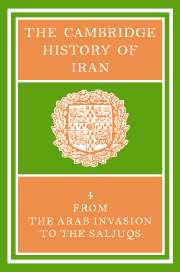Book contents
- Frontmatter
- 1 THE ARAB CONQUEST OF IRAN AND ITS AFTERMATH
- 2 THE ‘ABBĀSID CALIPHATE IN IRAN
- 3 THE ṬĀHIRIDS AND ṢAFFĀRIDS
- 4 The SĀMĀNIDS
- 5 THE EARLY GHAZNAVIDS
- 6 THE MINOR DYNASTIES OF NORTHERN IRAN
- 7 IRAN UNDER THE BŪYIDS
- 8 TRIBES, CITIES AND SOCIAL ORGANIZATION
- 9 THE VISUAL ARTS
- 10 NUMISMATICS
- 11 THE EXACT SCIENCES
- 12 LIFE SCIENCES, ALCHEMY AND MEDICINE
- 13(a) PHILOSOPHY AND COSMOLOGY
- (b) SŪFISM
- 14 THE RELIGIOUS SCIENCES
- 15 SECTS AND HERESIES
- 16 NĀSIR-I KHUSRAU AND IRANIAN ISMĀ‘ĪLĪSM
- 17 ZOROASTRIAN LITERATURE AFTER THE MUSLIM CONQUEST
- 18 ARABIC LITERATURE IN IRAN
- 19 THE RISE OF THE NEW PERSIAN LANGUAGE
- 20 (a) THE “RUBĀ'Ī” IN EARLY PERSIAN LITERATURE
- (b) ‘UMAR KHAYYĀM: ASTRONOMER, MATHEMATICIAN AND POET
- Bibliography
- Index
- Plate section
- Plate section">
- Map 1. Iran under the Abbasids">
- References
6 - THE MINOR DYNASTIES OF NORTHERN IRAN
Published online by Cambridge University Press: 28 March 2008
- Frontmatter
- 1 THE ARAB CONQUEST OF IRAN AND ITS AFTERMATH
- 2 THE ‘ABBĀSID CALIPHATE IN IRAN
- 3 THE ṬĀHIRIDS AND ṢAFFĀRIDS
- 4 The SĀMĀNIDS
- 5 THE EARLY GHAZNAVIDS
- 6 THE MINOR DYNASTIES OF NORTHERN IRAN
- 7 IRAN UNDER THE BŪYIDS
- 8 TRIBES, CITIES AND SOCIAL ORGANIZATION
- 9 THE VISUAL ARTS
- 10 NUMISMATICS
- 11 THE EXACT SCIENCES
- 12 LIFE SCIENCES, ALCHEMY AND MEDICINE
- 13(a) PHILOSOPHY AND COSMOLOGY
- (b) SŪFISM
- 14 THE RELIGIOUS SCIENCES
- 15 SECTS AND HERESIES
- 16 NĀSIR-I KHUSRAU AND IRANIAN ISMĀ‘ĪLĪSM
- 17 ZOROASTRIAN LITERATURE AFTER THE MUSLIM CONQUEST
- 18 ARABIC LITERATURE IN IRAN
- 19 THE RISE OF THE NEW PERSIAN LANGUAGE
- 20 (a) THE “RUBĀ'Ī” IN EARLY PERSIAN LITERATURE
- (b) ‘UMAR KHAYYĀM: ASTRONOMER, MATHEMATICIAN AND POET
- Bibliography
- Index
- Plate section
- Plate section">
- Map 1. Iran under the Abbasids">
- References
Summary
THE CASPIAN PROVINCES
Among the former provinces of the Sāsānian empire, the coastal regions along the southern shore of the Caspian Sea resisted the penetration of the Arabs and Islam most tenaciously. Protected by the lofty Alburz mountain range they escaped the main thrust of the Arab conquering armies as they advanced eastward into Khurāsān. Early Arab invasions were only partially successful. In the year 30/650–1, under the caliph 'Uthmān, Sa'īd b. al-'Āṣ entered Gurgan, the province touching the southeastern coast of the Caspian Sea, and imposed a tribute on its ruler. From there he marched westward to conquer parts of Tabaristān. These conquests were lost again during the struggle between ‘Alī and Mu‘āwiya for the caliphate, and the tribute for Gurgan was frequently withheld. Mu‘āwiya soon after gaining sole possession of the caliphate in 41/661 sent Masqala b. Hubaira to subjugate Tabaristān, but he and his army were annihilated in Rūyān to the west of Tabaristān. In the years 61-4/680–3 an attempt to conquer Tabaristān resulted in a defeat of the Kūfan general Muhammad b. al-Ash‘ath al-Kindī. Gurgān was not brought under Muslim rule until 98/716–17, when Yazīd b. al-Muhallab defeated the Chöl (Ar. Sūl) Turks of the Dihistān steppes north of the Atrak river, who had taken the country from its marzbān Fīrūz b. Qūl, and built the town of Gurgān (near modern Gunbad-i Qābūs) which became the capital of the Muslim province. Yazīd's further attempt to conquer Tabaristān ended in failure, and he was forced to leave the country after concluding a truce.
- Type
- Chapter
- Information
- The Cambridge History of Iran , pp. 198 - 249Publisher: Cambridge University PressPrint publication year: 1975
References
- 11
- Cited by

